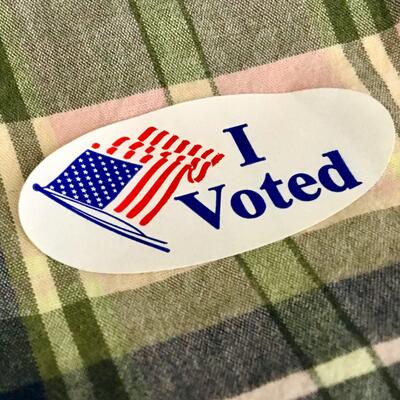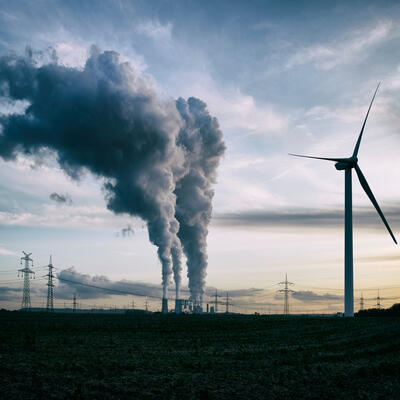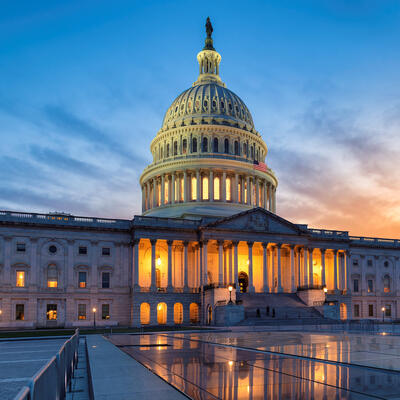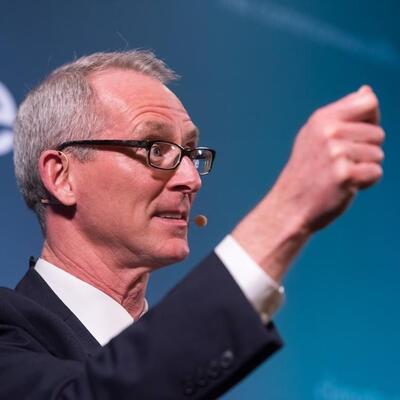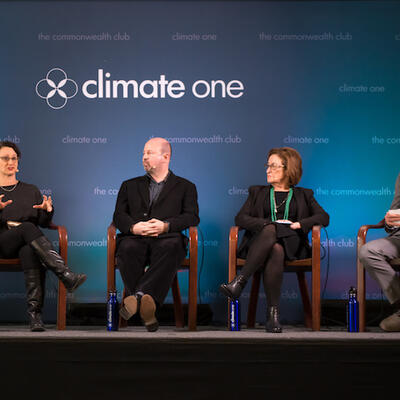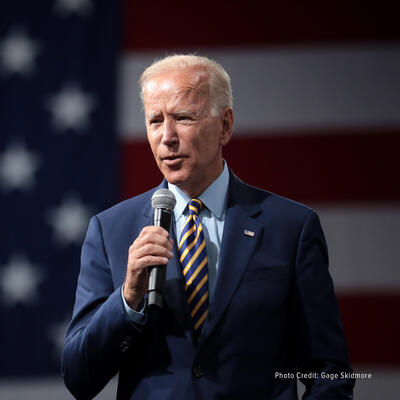
Biden’s Climate Opportunity (Part 1)
Guests
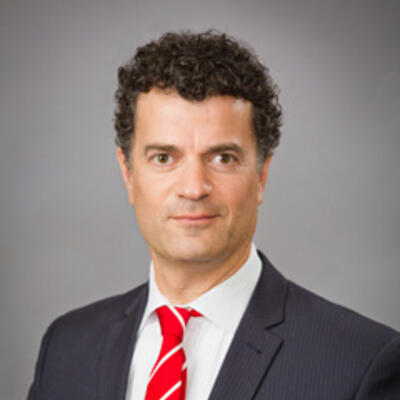
Jared Blumenfeld
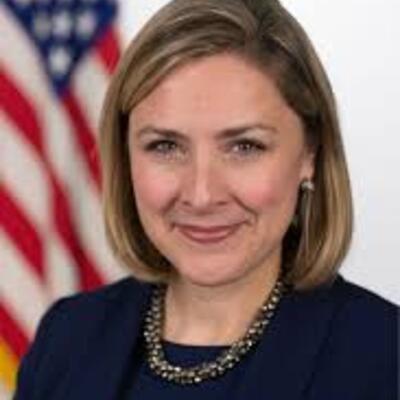
Christy Goldfuss
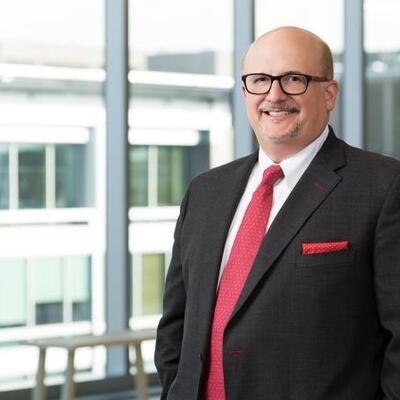
Scott Segal
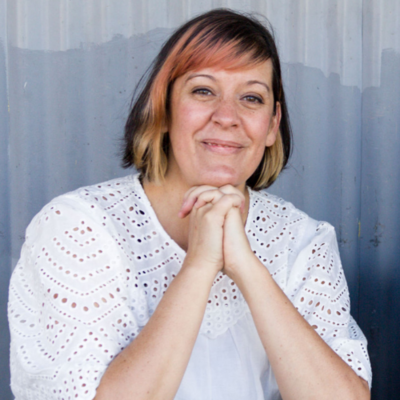
Amy Westervelt
Summary
President-elect Joe Biden says he will infuse climate change into every corner of his agenda. That’s becoming evident looking at his emerging team.
"You're already seeing signs from the nominees and the people they’re choosing that climate is going to be a part of every single agency," says Christy Goldfuss, Senior Vice President for Energy and Environment Policy at the Center for American Progress.
But it will take more than staff buy-in to get the country to net-zero emissions. When he’s sworn in on January 20th, Biden will likely be facing a Republican-led Senate that opposes his climate goals.
“That’s when it's a pleasure to have 47 years of public service at your disposal,” says Scott Segal of the lobbying firm Bracewell. “Because you realize that there is a way forward even on what would otherwise appear to be very, very partisan issues... I think energy and environment are some of those issues.”
But after the destructive environmental policies of the past four years, Biden has his work cut out for him to get us back on track in the climate fight. He’s announced an ambitious plan designed to achieve a one-hundred-percent clean economy and net-zero emissions by 2050, and is assembling a team of heavy hitters to get the job done – including John Kerry, one of the architects of the Paris Climate Agreement.
Still, Biden faces criticism from both sides. Republicans claim his plan is too expensive. Sunrise Movement and other progressives accuse him of not being ambitious enough. Amy Westervelt, host of the climate podcast ‘Drilled,’ says it’s time for everyone to get over it.
“People need to stop playing politics and do what needs to get done,” Westervelt asserts. “Whether it makes them popular or not, whether it means that they get reelected or not. We have a minimal amount of time; every scientist is saying that.”
Growing wildfires and severe storms prove the climate situation is dire. There’s no time to lose, warns Jared Blumenfeld, California’s Secretary for Environmental Protection.
“It’s kind of like, if we knew an asteroid was coming towards the planet and we're building like cardboard shelters to protect us,” Blumenfeld says. “And you’re asking us, like, could we build stronger cardboard shelters? No.”
Full Transcript
Greg Dalton: This is Climate One. I’m Greg Dalton.
President-elect Joe Biden says he will infuse climate change into every corner of his agenda. That’s becoming evident looking at his emerging team.
Christy Goldfuss: You're already seeing signs from the nominees and the people they’re choosing that climate is going to be a part of every single agency. [:09]
Greg Dalton: But it will take more than staff buy-in to get the country to net-zero emissions. When he’s sworn in on January 20th, Biden will likely be facing a Republican-led Senate that opposes his climate goals.
Scott Segal: That’s when it's a pleasure to have 47 years of public service at your disposal because you realize that there is a way forward even on what would otherwise appear to be very, very partisan issues... I think energy and environment are some of those issues. [:18]
Greg Dalton: Biden’s climate opportunity. Up next on Climate One.
---
Greg Dalton: Can the Biden Plan get us back on track to fight climate change?
Climate One conversations feature all aspects of the climate emergency: the individual and the systemic, the exciting and the scary. I’m Greg Dalton.
Greg Dalton: When President Obama took office in 2009 he pledged to take bold action on climate change, and while he did have some successes, there were also some missed opportunities. And the next administration did its best to roll back any progress that Obama and Biden made. Now growing wildfires and severe storms prove the climate situation is dire, and delay is costly.
Jared Blumenfeld is California’s Secretary for Environmental Protection. He warns that there’s no time to lose - and half-measures won’t do.
Jared Blumenfeld: It’s kind of like if we knew an asteroid was coming towards the planet and we're building like cardboard shelters to protect us ...and you’re asking us like could we build stronger cardboard shelters. No. [:11]
Greg Dalton: President-Elect Joe Biden has his work cut out for him to get us back up to speed. He’s announced an ambitious plan designed to achieve a one-hundred-percent clean economy and net-zero emissions by 2050, and is assembling a team of heavy hitters to get the job done. But he faces criticism from both sides. Republicans claim his plan is too expensive. Sunrise Movement and other progressives accuse him of not being ambitious enough. Amy Westervelt, host of the climate podcast ‘Drilled,’ says it’s time for everyone to get over it.
Amy Westervelt: People need to stop playing politics and do what needs to get done, whether it makes them popular or not, whether it means that they get reelected or not. We have a minimal amount of time; every scientist is saying that. [:13]
Greg Dalton: On today’s program, we’ll examine the Biden climate agenda -- what he hopes to accomplish and what he can get done, with or without congressional support.
Biden has a long history of reaching across the aisle, and there’s no question that bridge-building is a foundation of his political style. But in a congress so deeply divided, is that skill-set of any use? Joining me now are Scott Segal, a partner at the Washington DC law and lobbying firm Bracewell, which represents fossil fuel and other energy companies. Christy Goldfuss, Senior Vice President for Energy and Environment Policy at the Center for American Progress and a former official in the Obama White House. Segal thinks that when it comes to bipartisanship over climate, there is reason for hope.
PROGRAM PART 1 - SCOTT SEGAL/CHRISTY GOLDFUSS
Scott Segal: You know, it’s funny I'm regarded as a little bit Pollyanna for people who have industrial clients, but the truth of the matter is I think there are lots of opportunities to work together in a bipartisan fashion and certainly across the divide between industry, environmental organizations, public interest groups and the like. And so, just to give you some examples, you know, Joe Biden is a technological optimist. He has a lot of ideas about spurring on innovation and that’s something that the business community is very interested in. So, his proposal to set up an advance research projects administration that focuses on commercializing technology that can be of use in reducing climate change is important, very important and certainly common ground. There are lots of things that have to do with you know cleaning the power sector, cleaning up automobiles, etc. that are also areas of common ground where unlikely bedfellows would get together to advance a pro climate agenda. So, I am kind of excited that we have a number of opportunities to work together in the next couple of years.
Greg Dalton: And will you and your clients actually push Republican senators to get on board with that if there’s a Republican wall against anything climate?
Scott Segal: Well, I think what we can really do is explain how climate policy affects our industries, our workers, you know, the chances for a sustained economic recovery. And if we’re truthful to that, I think it will have the effect of pushing along particularly moderates on both sides of the aisle
Greg Dalton: Christy Goldfuss, you’re among former Obama administration officials calling on President-elect Joe Biden to pursue a climate ambition agenda building on the second term of the Obama administration. People who know the science say that Obama's efforts were not as ambitious as they should have been. Where can Joe Biden realistically be ambitious now given the fractured political landscape?
Christy Goldfuss: Well, a couple of points. I’d like to remind people that at the end of the Obama administration we were still operating under the science where we were trying to get to 80% by mid-century, 80% reductions. So, this is two years before the 1.5° report and we really weren't looking at the same set of facts that we have now. And when that 1.5° report came out a couple years ago it really entirely changed the policy landscape. It’s dramatically different to get to net zero by 2050 than it is to get to 80% because everybody sort of sees themselves in that last 20%. So, a lot has to be on the table. The full portfolio of policies needs to be on the table.
The other point I would make is we haven’t given up on Georgia. So, it will definitely either way, be a split Senate for sure. And we’ll have to see what the actual makeup it will be. But either way, there will be the need for bipartisanship and there will be the need as Scott has just said to really work across the aisle. And I, also I’m optimistic we even heard Mitch McConnell say something just the other day about working together on a large stimulus package with the new administration knowing that the Build Back Better agenda will take investment will take money. But when you look across the federal government as a whole, there are so many different opportunities and levers that the federal government has in each different agency. So, just to name a few of the ones that fit with the President-elect's agenda already.
You can look at the Treasury Department, which we didn't spend a lot of time focused on during the Obama administration. You can easily change really how easy it is to invest in fossil fuels or in renewables. You can tip the scales one way or another, with the existing tools at the Treasury Department. You can make money cheaper for one of those options or for the other. You can look at climate risk and really make that disclosure clear to the public what it's costing us. And you're already seeing signs from the nominees and the people they’re choosing that climate is going to be a part of every single agency. The Department of the Interior that’s where you have full control over oil and gas development on public lands and wind and renewables on public lands and offshore. So, I expect that you’re gonna see early action on offshore wind.
And then at USDA there is a huge pot of money that you could actually turn into a carbon bank without any engagement or change of legislation from Congress. And that carbon bank could really be used to incentivize renewable energy on agricultural lands and specific practices that are climate smart on agricultural lands. So those are just a few of the options, but really there are hundreds and hundreds of tools that when you use them appropriately and you think about the cost of inaction. The federal government can really signal where we’re headed and have a real impact on the ground.
Greg Dalton: Scott Segal, how much of what Christy just said do you think Republicans and your energy clients could get on board with?
Scott Segal: Well, a bunch of it. For example, the offshore wind. I mean, you know, Biden has promised that he'll double down to frequent verb choice he uses on the offshore wind. And, you know, who develops offshore wind these are large capital-intensive projects they’re not developed by, you know, charitable organizations, right.
They’re developed by large power companies working together with large power developers with, you know, power purchase agreements that have to be negotiated. And so, the vision that Christy laid out is a vision that I think is one that requires a lot of participation by very large corporations. And, you know, in terms of bringing money to bear the power of the government, you know, a lot of times when you talk about the development of new technology you frequently hear this expression of the valley of death. Somebody has a good idea. They raise a little bit of money and then getting it between there and commercialization is a big problem. The government can play a really critical role in incentivizing that kind of technological development. And I will say this, that 2050, you know, complete decarbonization of the economy by 2050 and the interim goal of 2035 for the power sector particularly the power sector goal would require substantial technological breakthroughs to get it done and that means the government has to really participate in it.
I mean, even as we sit here today, you know the power sector spending about $110 billion a year on everything from grid improvements to diversifying the energy mix to the development of new technologies that consumers can use to manage their electricity use. And, you know, that’s resulted, and I'm sure as Christy knows, substantial reductions in the amount of CO2 that's released per unit of electricity that's generated. So, it's been a good story.
And, you know, natural gas obviously plays a part of that story too. And one thing I want to stress here is a bit of the pragmatism of Joe Biden. You know it's interesting that when the Paris Accord was being signed in that airplane hangar in Paris. Joe Biden was also in Europe, and he was meeting with folks in Eastern Europe, encouraging them to not rely on Russian natural gas. But to instead consider some of the new technology that we developed in the United States a little thing we call hydraulic fracturing and to consider potentially purchasing natural gas from American sources in the form of LNG.
So, you know, there's a pragmatism there. I think Joe Biden’s got a lot going on. He wants to shepherd economic recovery in the United States and he wants to do that in ways that make a lot of sense that developed buildout green infrastructure. He’s talked about that at some length. But he also has loyalties and relies upon organized labor who tell him that there are go and no go zones a little bit that have to be taken into account. And, you know, he's also somebody who I believe politically can walk and chew gum at the same time. I was thrilled the other day to see his interview with, I hate to mention another media source, but with Tom Friedman over at the New York Times. And by the way, I'm not always thrilled to mention Tom Friedman of the New York Times, but he said in about working with Mitch McConnell that should be the way things operate. He said, “I think there are trade-offs, but not all compromise is walking away from principal. He knows me. I know him and I don't ask him to embarrass himself in order to make a deal.”
You know, that's when it's a pleasure to have 47 years of public service at your disposal because you realize that there is a way forward even on what would otherwise appear to be very, very partisan issues. You can reach common ground. I think energy and environment are some of those issues which at first glance look very partisan, but then when you peel it back you see, no there’s actually regional they deal with issues of consumer choice. They deal with issues of price and supply and they’re a lot more complicated. And I think you need adult supervision and I think we’re gonna get some of that with Biden personally.
Greg Dalton: Republican Senator Lisa Murkowski and Democratic Senator Joe Manchin have proposed the comprehensive energy bill that includes nuclear power renewables carbon capture favored by fossil fuel interest. Senator Manchin said he's optimistic. What are the prospects for that getting done this year?
Scott Segal: Well –
Christy Goldfuss: Yeah, where’s your optimism on this one, Scott?
Scott Segal: First of all, the bill that Greg laid out unfortunately is not the bill that is currently under discussion. I refer to it as the incredible shrinking energy bill. And, you know, Lisa Murkowski has been an excellent chair of the Senate Energy and Natural Resources Committee and this is in many ways a legacy issue for her and she's pushing it very hard. She’s had direct conversations with the chairman of the Energy and Commerce Committee and the House Representative Frank Pallone, and they’ve talked about areas of common ground where they could advance it. In the last week or so there's been a quite a few of very late nights among staff trying to elide certain provisions and keep other provisions to see what can be done. Notably the tax provisions which are really so important in these early days for common ground seem to be gone, anything that is particularly prescriptive seems to be gone. You know I've been watching very, very carefully the compromise on hydrofluorocarbons, which as Christy I’m sure knows are a very powerful global greenhouse gas and really need to be phased out in an orderly fashion, preferably a federal fashion in order to ensure that next generations of U.S. appliances can be sold overseas and here.
So, there's an industry case as well as an environmental case for reaching conclusion on that. And I think that is going to advance whether it advances in the context of an energy bill or in a broader omnibus spending bill is a good question. You mentioned carbon capture and sequestration. I'm very proud of and that's part of this discussion too in the so-called USE IT bill and don’t make me tell you what the acronym stands for. But it's basically a CCS or carbon capture and sequestration research bill. And I'll tell you, I'm proud of the Biden campaign for not being afraid to utter the phrase carbon capture and sequestration. There are some who would say if you develop that technology then it perpetuates the amount of time that we’ll have fossil fuels. But the way I look at it is it provides a mechanism where you can continue to have the reliability and hopefully if the technology is robust the affordability associated which are some of the benefits of fossil fuels continue to have those but still cast a weather eye, no pun intended, on climate change and reduce the amount of carbon that’s emitted substantially. In fact, some day there will be CCS that will be almost 100% effective, it'll be almost. But, you know, that would be a great day, it would be an ability for a whole lot of different sources of power generation and motor fuels to exist in the same space. So that would be good.
Greg Dalton: Scott Segal, Joe Biden has pledged to make climate justice a pillar of his agenda. Energy companies have a well-documented record of placing refineries and polluting plants in the neighborhoods of communities of color that have less political power. Your firm represents those companies or at least the industries that have practiced environmental racism. How have your views about that change this year during America's racial reckoning?
Scott Segal: Well, you know, the first observation is that of course there's been a significant increase in concentration of resources and attention particularly at the plant line of facilities. I do want to correct one mistake you made in your statement though, Greg. You seem to imply that petroleum refineries or petrochemical plants or whatever seek out poor neighborhoods and then construct their facilities. That is exactly the opposite of the way it works. The way it works is when these facilities were built there was no community at all around them. And then because it does in fact suppress land values that much is true when you build an industrial facility, then communities built up around the plant line. It's not the other way around. Can you imagine a more ludicrous policy than seeking out front-line communities to put facilities in. They don’t put facilities –
Christy Goldfuss: It is not as simple as what you just described either. We’re working very closely with environmental justice communities that had these facilities pop up in their backyard, those humans were it’s not –
Scott Segal: That’s not true. That’s not true. I'm sorry, Christy, I agree with you on most things but think about it. What would the reason be, what would the reason be? It’s silly. And by the way, it doesn't mean there isn’t an environmental justice issue. I want to be clear about that --
Christy Goldfuss: I will send you actual documented evidence of human beings whose communities were impacted after these facilities were built. It was not that there were no people who were there. Their communities were ignored in the permitting process. It happens all the time.
Greg Dalton: Dr. Robert Bullard is noted as the father of environmental justice and I believe it was a facility in a middle-class black neighborhood in Texas. I think it was either an incinerator or waste facility that was targeted towards it wasn't poor black it was middle-class black neighborhood. Now, you know, I also know that the Richmond Refinery and Chevron I think is the biggest source of carbon pollution in California. Not many people were there and that was there before the community was around it. So, there’s cases of both but there are certainly cases on both sides of that. But Scott Segal, you know, back to the sort of the racial reckoning that America has when are we gonna stop polluting these people's lives?
Scott Segal: Well, look, I mean I completely agree with you that we have a history of disproportionate impact on communities of color. And one of the reasons we have that disproportionate impact is because you know facilities did not control emissions in a way that they should or could. But I do think if you're being fair about this, you have to admit that air emissions including toxic air emissions have been declining, not increasing in these communities and that hundreds of billions of dollars are spent on emissions control. Now you can say that's not a charitable expenditure, it's forced by government, that's partially true but it's also forced by the sustainability and environmental goals that corporations set. So, it's complex but yes that more of that should happen. And I think in every day in every way companies are advancing goals, some of which are prompted by government, and some of which are prompted by investment and some of which are prompted by simply good corporate governance. So, we're seeing it and the data the clean-air trends report for example, out of EPA which is generally regarded as coin of the realm in terms of air emissions at least shows substantial reductions year after year upon year. So, you know, I understand the point and it's an important one, but it's not like industry is taking no action to address it.
---
Greg Dalton: You’re listening to a Climate One conversation about Joe Biden’s opportunity to heal our climate. Coming up, a peek inside the cabinet - including one potential appointee that could make history.
Christy Goldfuss: The significance of a Native American in that position, in the Department of Interior, which in so many ways was really designed to persecute Native Americans, is just incredibly powerful. [:14]
Greg Dalton: That’s up next, when Climate One continues.
---
Greg Dalton: This is Climate One. I’m Greg Dalton, and we’re talking about Biden’s climate opportunities, with Christy Goldfuss of the Center for American Progress and Scott Segal, a lobbyist for fossil fuel and other energy companies at the Washington DC firm Bracewell.
One of Ronald Reagan’s mantras was “personnel is policy.” During Donald Trump’s tenure, he made a number of arguably unfit, even destructive, cabinet picks, especially when it came to the environment. President-elect Biden has the opportunity to reverse that, and he’s made it clear that climate will be a high priority. His appointment of John Kerry, an architect of the Paris Climate Agreement, to the newly-created position of climate envoy, was well received in many quarters.
Some of Biden’s other choices have generated controversy. Brian Deese, who, as a member of the Obama administration also helped craft the Paris agreement, has been named head of the National Economic Council. Activists on the left have raised objections about Deese, because he now works for the giant investment management firm BlackRock. Does this suggest that Biden will have a hard time placating progressives?
PROGRAM PART 2 - SCOTT SEGAL/CHRISTY GOLDFUSS
Christy Goldfuss: Oh, absolutely this is gonna be a challenge. There is a real active and successful climate movement that we didn't have in the Obama administration. The shift in the discussion around climate policy since 2017, 2018, the emergence of the Green New Deal network, the Sunrise Movement. This is activism that has brought about change in two, three-year period that we haven't seen in decades on climate change. So, they’re right to demand things be done differently. The reason that I came out so strongly as I did for Brian Deese is because I know him and I got to see what a magician he is in accomplishing and tackling big problems. And that's hard to say, trust me because I worked with him so I tried very hard to point to the Paris agreement, the 125-million-acre withdrawal in the Arctic Ocean. All the land protections we did together, the Kigali Agreement, I mean the list is very long of climate accomplishments that he really was our bandleader for the last two years of the Obama administration. It was remarkable. And I do think he's gonna be able to work with activists. And once we get to that point where he’s in his seat, he’s also gonna be the head of the NEC. I mean the idea that we’re gonna have a climate champion who is leading the National Economic Council? This used to be the gatekeeper in the Obama administration in the beginning that would stop a lot of the regulatory actions because they were contrary to our recovery. We are now gonna have a partner there who’s gonna be thinking about how to invest in clean energy and really set us on the right path for our climate goals in addition to rebuilding our economy and that is invaluable
Greg Dalton: Scott Segal, you welcome the appointment of John Kerry as climate envoy because of his experience and expertise. He has stature he has the trust of the president but controls no budget and has no army of bureaucrats. So how do you think John Kerry will be as the climate envoy?
Scott Segal: Well, the first thing I’d say is that the job he’s being asked to do doesn't require a large bureaucracy. Because in terms of negotiating deals there are people that are professionals in the federal government that are tasked with doing that and being supportive, whether they be in the State Department, the United States trade representative's office, you know, and elsewhere even EPA's international office such that is. There are lots of places where we have the reservoir of expertise that can backup John Kerry.
Why I liked the Kerry appointment is it’s an appointment of stature. Look, if the United States is gonna rejoin Paris and I was not supportive of the United States leaving Paris in the first instance. But if the United States is gonna rejoin Paris, if the United States is going to hold its head high going into Glasgow, then we need people that prove the value proposition that the Biden administration is a different kettle of fish, that it is one that's sending someone who frankly could've been president of the United States I mean he was the nominee of this party. So, I think that that's a good sign. And by the way a lot of people in the industry will tell you this, that climate change is inherently an international matter. That doesn't mean you shouldn't adopt domestic policies. But it is an international matter, you know, a single molecule of CO2 released in the United States today is literally around the world in seven days. So, you have to put a good team in the field.
Now, I'll tell you there's another side of this, which is we understand there will be a domestic policy chief for climate change. And the discussion about Brian Deese he could have easily filled that role too. I do agree with Christy, he’s a very talented guy particularly on some clean energy issues that I worked with him on back in the day. And I just remember thinking, god he’s so young and he’s still young. That's what’s amazing. The whole business about BlackRock is a complete ruse because what did he do at BlackRock? Well, he was in charge of their environment and sustainability investing. He is in charge of the what we call the ESG function. And while people can criticize BlackRock for being progressive or not progressive enough. They certainly led with their chin on those issues and I can only say he was responsible for it. So that doesn't bother me at all.
I am curious who will be the domestic policy advisor. And this is the interesting bit of a Washington parlor game for us to think about for a second. Because now that you have John Kerry as the envoy, do you need an equal and opposite someone who's a governor, a senator, somebody like that to lead this domestic this domestic role? Maybe. On the other hand, there are a lot of people who are really good at it. I think about Ali Zaidi for example up in New York who’s been kind of playing that role for Governor Cuomo. Maybe that he’d be a good choice. You don't have to have a former senator to do the nitty-gritty work of domestic side. Whereas on the foreign side you do need someone that can be credible with heads of state. And that's why I think Kerry is an interesting choice.
Greg Dalton: Christy Goldfuss, one of the most talked about possible appointments is Congresswoman Deb Haaland being the first Native American to head the U.S. Department of Interior, which oversees federal lands, including the national parks. You served as deputy director of the National Park Service. What could be the significance of a Native American overseeing America's public lands and parks?
Christy Goldfuss: It gives me goosebumps every time I think about it. The significance of a Native American in that position in the Department of Interior, which in so many ways was really designed to persecute Native Americans is just incredibly powerful. Now, there's Deb Haaland who is just an incredibly powerful second term congresswoman now she just finished her first. And really from the moment she came to Washington DC and was on the House Natural Resources Committee, she’s been a powerhouse and really stood out. So, I'm not surprised at all that she's on this list. But then we also have Mike Connor who served as deputy director when I was there and who is also a Native American and is on the short list for this job.
So, I think we have a whole set of amazing candidates for the Department of the Interior. But given what President-elect Biden ran on and really his commitment to correcting wrongs of the past, putting a Native American in that seat would actually just be historic. And now that we have two really such strong names that can be considered, I think it's hard to imagine that it wouldn't be one of them, as it has been floated in the press. But there are certainly, Tom Udall, whose whole family has been dedicated to the Department of Interior and really building that amazing legacy, would do a phenomenal job at that job as well. So, but it has turned out to be one of the most contentious and sought-after positions in the whole cabinet right now and really has played out more in public than I'm sure the transition would like.
Scott Segal: Yeah, Greg, I can’t say that I know Deb Haaland. I’ve certainly observed her from a distance and she's impressive. I would though, you know, whether we’re talking about Deb Haaland or talking about Udall and even some people have mentioned Martin Heinrich also another New Mexico senator.
Christy Goldfuss: It’s all New Mexico.
Scott Segal: All New Mexico all the time. And one thing I would observe, though, that's kind of interesting to me. You know, 37% of the state of New Mexico is public land I mean is federal land. An incredible percentage. And a lot of that federal land, not a lot, by area, but on that federal land there is a significant amount of oil and gas development mostly natural gas development that has been important and on Indian land as well. And in fact, just to give you a statistic which you might find interesting. New Mexico is not a wealthy state but a billion dollars goes to New Mexico in royalty based on production on federal lands every year. So, it's a mixed bag.
Now, I know Deb Haaland is thinking bigger thoughts about, not only her place in history but also how the Interior Department could be structured in a way that particularly would address past wrongs. But one of the early statements that’s made about what to do on federal lands is basically what not to do where the Biden folks have said, well, let’s push the pause button for example, on new leases on federal land. One thing is there, you know, there's two sides to every coin. I was interested to hear Governor Lujan Grisham, who’s been played a major role in the Biden campaign, say geez, if you’re gonna try and stop all production on federal land and that's not exactly what she said but if you're going to start to do that I think New Mexico's gonna have to not be part of that. So, there’s tension there and not every proposal goes 100% in one direction. So, not every appointment does either. So, there is some tension there to think about.
======================================
[TRANSITION TO NEXT GUESTS: AMY WESTERVELT/JARED BLUMENFELD]
Greg Dalton: We’ve been talking about Joe Biden’s opportunities and challenges, in moving the country away from fossil fuels, with Scott Segal, an energy lobbyist with the firm Bracewell, and Christy Goldfuss, Senior Vice President of Energy and Environment Policy at the Center for American Progress.
I’m joined now by Amy Westervelt, the host of Drilled, a true-crime podcast about climate change, and Jared Blumenfeld, California Secretary for Environmental Protection. The last four years have left our country even more divided along party lines, despite overwhelming scientific evidence climate change is happening. Still, Jared Blumenfeld thinks there could be hope for a bipartisan effort.
======================================
Jared Blumenfeld: For me, you know already Biden is trying to reach out. I think he’s a natural bridge builder, I mean to a fault in the Senate, and I think there's critique for some of the folks he reached across the aisle to. And yet, you’re not seeing a lot of hand coming back across the aisle towards him.
The thing that we learn from the Obama administration is you know at some point you need to just take the action and that's why Biden was elected. That's why we're in the jobs that the we do in government is to take the action. And science is even clearer now than it was eight years ago. Oh my God more than eight years ago, 12 years ago when Obama started, Jesus that’s terrifying. Anyway, the science had become clearer, the imperative for action has become clearer. We just did the all hands meeting with all our staff and we actually had 4500 people on the Zoom this morning and we showed a picture of Ronald Reagan signing the California Clean Air Act. And, you know, there’s this hope that we can get back to the place where you know Nixon created U.S. EPA, Nixon signed the Clean Water Act the Clean Air Act, SEQUA, all these things came in a bipartisan spirit would not in that place right now. So, we can, I think always try always work to make this a nonpartisan issue which it is. But at some point, we need to roll up our sleeves and get the job done.
Greg Dalton: And there are few glimmers. Susan Collins and Mitt Romney have said that they expect the president have wide latitude on cabinet appointments. So, there’s a few littles signals there. Amy Westervelt, you tweeted recently that Democrats are “A bunch of moderate bureaucrats.” How much confidence do you have in California Gov. Gavin Newsom and other Democrats to do what's necessary on climate in 2021?
Amy Westervelt: I have way more confidence in California Democrats doing things that are necessary than I do of the party nationally. I don’t know on the bipartisan thing; I just feel like the only people I ever hear even saying anything about that with any sort of concern is Democrats. And that kind of tells you where we’re at on bipartisanship.
I think that the time for compromise has passed. I mean, I think like it would have been great if we could have compromised in the 90s or even the early 2000s or even the mid-2000s but it didn’t happen. Like it didn’t happen in a way that delivered the sort of action that was necessary and now I feel like people need to stop playing politics and do what needs to get done, whether it makes them popular or not, whether it means that they get reelected or not. We have a minimal amount of time every scientist is saying that, and I hope that Democrats will kind of take on what does seem to be somewhat of a climate mandate from voters and just do what needs to be done.
---
Greg Dalton: You're listening to a conversation about meeting our country’s carbon reduction goals. This is Climate One. Coming up - facing up to the real climate problem.
Amy Westervelt: The problem with climate is not an energy problem or a technology problem in my opinion it's a power problem. And I don't mean electrical power, I mean structural power. [:10]
Greg Dalton: That’s up next, when Climate One continues.
---
Greg Dalton: This is Climate One. I’m Greg Dalton. We’re talking about Joe Biden’s opportunities for addressing the climate crisis. My guests are Jared Blumenfeld, California’s Secretary for Environmental Protection, and Amy Westervelt, host of the energy podcast ‘Drilled.’ Fun fact, Climate One and Drilled were both up for the iHeart Radio ‘Best Green Podcast’ Award presented earlier this year. Congratulations to Amy and her team for taking home the trophy.
Much of America's energy lies in the West and a lot of the leading climate policies originate in California, Washington and Oregon. So let’s dig in a bit on what's happening in that part of the country. Transportation is the biggest source of greenhouse gas emissions now. California's strict fuel efficiency standards are central to the state’s climate action plans. When the Trump administration tried to strike those down, the auto industry took sides, with GM and Toyota on Team Trump and Ford, VW and BMW aligned with California. What’s the path forward, now that California has an ally in the Biden administration?
PROGRAM PART 3 - AMY WESTERVELT/JARED BLUMENFELD
Jared Blumenfeld: I mean this is steeped in a lot of politics that ends up in DC. California because we had a clean-air problem before the Clean Air Act came into force, Greg, we have authority under the Clean Air Act to set stricter limits than the rest of the nation. And 14 other states and DC follow California. So, it isn’t just California it’s actually a mandate that others follow. And in the past, two things. One, that’s never, it’s very, very clear that we have that authority. The Trump administration and actually some of those car companies joined in a lawsuit against California. I hope, and this is one of the promises of the Biden administrations as they can quickly direct the Department of Justice quickly direct the Department of Transportation the EPA to say, you know what we need to work with California, not against it. Really, when you look at the global trends this is moving in one direction, which is electrification, everyone knows that. Mary Barra from GM others you know in Toyota they are all talking about what they want to achieve. What the real issue is that they are making a lot of money right now on 4x4's, pickup trucks and they want to continue doing that without any penalty. They don't want to have to take action here. The same action that they are taking towards zero-emission vehicles in China, in the European Union, nearly in every other market.
So, our thinking really is that at some point we need to do two things. We need to sort out where we go between now and 2026. That was the key date when President Obama was in office and we were coming out of the economic recession. The car companies were near collapsed, they did a deal that created one harmonized standard between the federal, the cars and California. And now we have, as you pointed out, we got the federal government and California on one side and half the auto manufacturers on our side and then half the auto manufacturers still wondering what the hell to do. They’re kind of 10 feet off like Wile E. Coyote, 10 feet off the cliff they don’t realize there’s nothing underneath their feet. And they soon will.
So, at some point and we already had them reach out to us. I think they’re gonna realize that they’re in an untenable position. We need one standard that clearly, clearly reduces greenhouse gas emissions from tailpipes and moves us quickly towards the zero-emission future as you were kind of alluding to Greg, you know a lot of leadership has come from California. The Governor Gavin Newsom came out with an executive order saying by 2035 all new passenger vehicle sales have to be zero-emission. Colorado then said they do the same thing. New Jersey's doing the same thing. The UK two days ago said they’re setting the date to 2030. They originally had it at 2050. So, you're getting a lot of momentum here and I think the federal government will eventually catch up.
Greg Dalton: Jared Blumenfeld, California Gov. Gavin Newsom signed an executive order banning fracking in the state by 2024. And a few weeks later approved six new wells owned by a company represented by Axiom Advisors, a lobbying firm with close ties to the governor that's been in the news lately. How serious is he about banning fracking?
Jared Blumenfeld: We need to think about we spend a lot of time thinking about the demand-side, right. So, the demand side is how we reduce demand in vehicles in homes in our society. And the major thrust has really been around those issues when you talk to the climate movement for the last thirty years. I think environmental justice advocates, whether they're in the Amazon, or in Wilmington, California or Kern County and now saying you know what we only actually need to go overseas to see some pretty dramatic issues of pollution in people's lives. People are living very, very close to oil extraction. And so, there's a big environmental justice movement in the state which is about making sure there’s health and equity and protective setbacks for oil and gas production in the state. So, there’s been a very big focus, and rightly so on the supply side. Actually, we’re doing a UC Berkeley study that’s coming out this month in December on looking at the twin, how you calibrate supply and demand, how you move towards our goal is to get by 2045 to a carbon neutral economy.
So, that means in-state what does that mean for supply? When you look at fracking, fracking is a very, very de minimis part of the equation. You know on the East Coast where the shale and other formations are different. It's a very, very different ballgame. But in California, you know it's less than 5% of oil production is fracking. So, I don't want to say fracking is not an issue. It sadly is, however, the bigger issue is how we deal with supply. How do we phase out supply in a manageable way and how do we do it in such a way that there’s a just transition unlike Appalachia where, you know, the coal industry was decimated and there was really a lot of economic dislocation. How do we make sure that low income communities of color are actually benefiting from the transition rather than their families being caught up in this? So, it gets very complicated quickly but it’s really important to focus on and I think for the first time we’re doing that. Our goal is partly to make sure that we don't just ban all production in California while there’s still a need for it and allow Venezuelan crude, Saudi crude to come in which has no environmental regulations or standards.
So, the important thing is to have a roadmap toward zero. We need to get zero as the goal when it comes to extraction around the world, wherever the oil comes from. We need to get to a place where we don't extract any more or extract very, very, very, very small percentage of what we do now. So, Greg, that’s our goal. In the meantime, the governor has said yeah, I wanna work with the legislature to actually ban fracking. But it would be a Pyrrhic victory if we ban fracking but increase oil supplies generally.
Greg Dalton: Amy, one ongoing debate on Climate One is avenues for addressing the climate emergency: personal action, going solar, plant-based, electric and systems change confronting economic and political power and structural racism. How do you think about individual action and the need for systems change?
Amy Westervelt: I think that they’re deeply intertwined. I think that the debate between systems change and individual action that turns it into some sort of either/or is really unproductive and not helpful. And basically, I think that you know –
Greg Dalton: So, we need to do both at the same time?
Amy Westervelt: You need to do both. You need to do both. And I think that we have a real problem in this country of thinking about personal action only in terms of consumption and not in terms of organizing. And, you know, political action and like voting and, yeah, exactly, you know, or like looking at as an individual how can I spur more change in my community. Things like that versus do I buy this cup or that cup. You know like this cup or that cup thing fine, sure, do that too, you know, like people should do things that feel like they’re in line with their values and what, you know, where they want the world to go. But, yeah, I think, you know, there are ways for individuals to plug in to system change and we need individuals to lead systems change and inspire other people to do the same.
Greg Dalton: Jared, you’re a systems thinker and have interviewed systems thinkers on your podcast. How do you think about connecting individual action, at the same time changing systems?
Jared Blumenfeld: I mean when I was chiming in, you know, the issue of voting like doesn't seem like it’s kind of caught up to the environmental movement as much. It’ll be interesting to see the stats that come out of this most recent election.
I did this interview with this guy, Nathaniel Stinnett from the Environmental Voter Project. And he was saying that in 2016, 50% of environmentalists, namely people for whom climate change is the number one issue 50% of people voted for the population as a whole it was 60%. So, we vote 10% below and that's local elections statewide elections. So first of all, vote.
Secondly, I think you know to your point, Greg, about the misinformation and the distraction that the oil companies have kind of lulled us into the sense of if only we just got a paper straw the world will be fine, is to avoid their own culpability and responsibilities. So, the main thing I think we need is strong smart regulations that protect public health and the environment that are coordinated really between the European Union and California and the rest of the United States. And, you know, really thinking about the scientific premise, I think we still as an environmental movement, and as Democrats don't believe enough, which is what Amy started with, which is our lives really do depend on this. The science is extremely clear, right and we see talking of systems we see natural systems collapsing. You know, we see the pandemic. We got 4 million acres of California that burned this year. Our systems are failing and our response has to be bold it has to move away from incrementalism because if it doesn’t, we’re not responding to the threat at hand, right. It is kind of like if we knew an asteroid was coming towards the planet and we're building like cardboard shelters to protect us like at some point, like well and you’re asking us like could we build stronger carboard shelters. No. We actually need to build a real defense system and that defense system is gonna be expensive it’s gonna take a lot of people it’s gonna take a concerted effort. And we’re already, you know, Amy said, like I’d be great if we had consensus in the 90s. We kind of had scientific consensus we just haven't had political consensus. So, people don't want to do everything themselves. They want you know I think about the Americans with Disabilities Act. We don't talk about buildings being disabled friendly, right. We just talk about buildings. The same has to be true of everything we just need to bake in climate change to every single thing that we do. So, it doesn't become this thing but just every building is electrified every car is electric every aspect of our life is decarbonized. So, we don’t need to do it, someone else has, and that someone is government.
Greg Dalton: It seems like that’s a moment right now. Because when Obama came in it was healthcare first, we’ll fix the economy, then healthcare and then climate three. Right now, there's COVID, economy, there's racial reckoning and climate. So, now there seems to be an opportunity to try to weave those together in a way not ordering people or talking about to try to weave them together and problem solve for multiple problems at the same time. So, Amy how do you think that can be done to sort of weave race climate and COVID together?
Amy Westervelt: Yeah, well, I mean I think the drivers of those problems are all woven together already. So, it's not like to me it’s sort of like of course you would approach all those things at once because how can you solve for climate if you don't solve for income inequality and you don't solve for racial inequality. In my mind there is no real solution that is simply swapping one energy source for another because the problem with climate is not an energy problem or a technology problem in my opinion it's a power problem. And I don't mean electrical power I mean structural power. You don’t get a problem like climate change where we had global scientific consensus decades ago. We knew exactly what needed to be done. And a small handful of people made decisions that impacted the entire world for their own gain without capitalism on steroids white supremacy and a little patriarchy thrown in. Like we have a system that gives a lot of power to very few people. And that like solving for that is the solve for climate, race, COVID and, you know, the economy all at once.
---
Greg Dalton: You’ve been listening to Climate One. We’ve been talking about the path forward for climate policy in the Biden administration. My guests were Amy Westervelt, founder of the Critical Frequency Podcast Network and host of the podcast ‘Drilled,’ and Jared Blumenfeld, California Secretary for Environmental Protection. Earlier, we spoke with Christy Goldfuss, who heads up Energy and Environment Policy at the Center for American Progress, and Scott Segal, who represents energy companies at the Washington DC lobbying firm Bracewell.
Greg Dalton: To hear more Climate One conversations, subscribe to our podcast on Apple Podcasts, Spotify or wherever you get your pods. Please help us get people talking more about climate by giving us a rating or review. It really does help advance the climate conversation.
Greg Dalton: Kelli Pennington directs our audience engagement. Tyler Reed is our producer. Sara-Katherine Coxon is the strategy and content manager. Steve Fox is director of advancement. Anny Celsi edited the program. Our audio team is Mark Kirchner, Arnav Gupta, and Andrew Stelzer. Dr. Gloria Duffy is CEO of The Commonwealth Club of California, where our program originates. I’m Greg Dalton.

